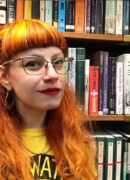Course Information
| Session |
|---|
| Credits | 1.5 CEUs or 15 PDHs |
|---|
$250.00
Credits: 1.5 CEUs or 15 PDHs
This course is designed to support information professionals in creating their own critical reflective practice to support their personal and professional growth.
Critical Reflective Practice is how we close the gaps between what we say and what we do when it comes to diversity, equity, inclusion and justice. It is a powerful tool that asks us to analyze our assumptions and take into account how our privileges and biases show up in our actions. This introspection is then used to help us to break those cycles. Through written reflections, introspective activities, and discussion, students will see the threads that connect their beliefs to their actions, and find the places that need interruption or nurturing.
This course is created to support all types of information workers in various fields and levels of experience.
This course is designed to support information professionals in creating their own critical reflective practice to support their personal and professional growth.
Critical Reflective Practice is how we close the gaps between what we say and what we do when it comes to diversity, equity, inclusion and justice. It is a powerful tool that asks us to analyze our assumptions and take into account how our privileges and biases show up in our actions. This introspection is then used to help us to break those cycles. Through written reflections, introspective activities, and discussion, students will see the threads that connect their beliefs to their actions, and find the places that need interruption or nurturing.
This course is created to support all types of information workers in various fields and levels of experience.
 Emma Karin Eriksson (she/her) is an activist-academic whose personal and professional life is driven by a commitment to social justice. Believing deeply in people over property and profit Emma sees libraries as a place of liberation. She is a Senior Young Adult Librarian for the Brooklyn Public Library, a radical facilitator, and zine maker. To learn more about her, her work, or to get in contact visit www.bit.ly/emmakarin.
Emma Karin Eriksson (she/her) is an activist-academic whose personal and professional life is driven by a commitment to social justice. Believing deeply in people over property and profit Emma sees libraries as a place of liberation. She is a Senior Young Adult Librarian for the Brooklyn Public Library, a radical facilitator, and zine maker. To learn more about her, her work, or to get in contact visit www.bit.ly/emmakarin.
Reviews
There are no reviews yet.